Poi – it’s in the DNA
Jul 21, 2022

Ōtepoti business Pōtiki Poi is a mother/daughter duo producing poi sold worldwide. They’ve also co-written a pukapuka about the whakapapa of poi, and most recently opened the Kura Poi Dance Academy.
Kaituhi Ila Couch talks to Georgia and Anna Tiatia Fa-atoese Latu about setting up a successful kaupapa Māori pakihi, and their plans to ensure a taonga from the past will continue to evolve.
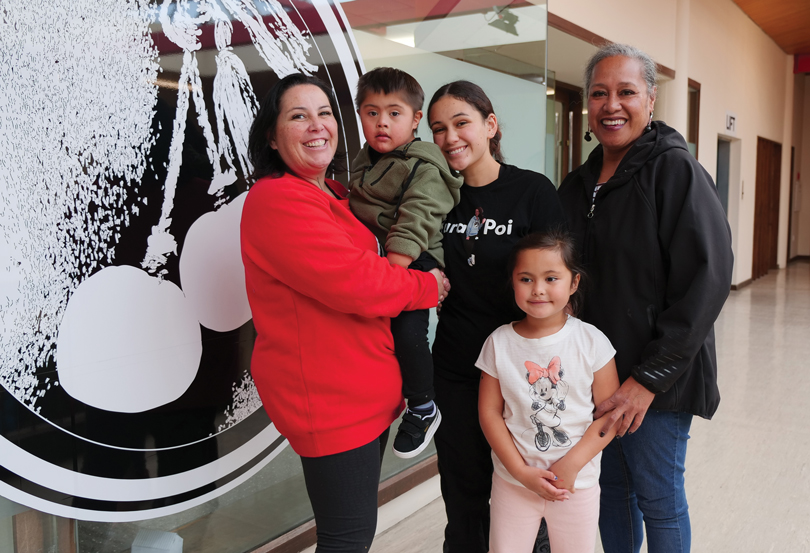
Above: A whānau affair. Anna Latu with her tamariki Api, Georgia, Kyra, and mother-in-law Lagi Latu outside Pōtiki Poi headquarters.
In a brightly-lit studio on a grey Dunedin day, Anna Latu sits on the perimeter of the dance floor watching her 15-year-old daughter Georgia and her friend Abby teach a class at the Kura Poi Dance Academy.
Big sister to Kyra (4), and Apiteniko (Api) (3), Georgia knows how to keep the rōpū focused. One minute she is leading a poi procession, the next a group aged between 5-8 are sitting across from each other learning the basics of tī rākau. When the session is over, it ends the same way it began – with karakia.
There is elevator access to the second floor studio which makes the space accessible for people with diverse abilities. “We don’t like using the word ‘dis’ ability just because it ‘disses’ people,” says Georgia. “We want everyone to rise together.”
Five class levels are held throughout the week, each tailored to a specific age group and designed to build and develop knowledge as tauira progress through the academy. Parents stay with their babies in the pipi paopao/under five group. They learn parts of the poi, how to handle them, and what to do while practising basic moves through fun games. There are teina/primary (5-8), tūwaenga/intermediate (9-12) and tuakana/high school (12-17) age groups with set goals aimed at building proficiency at every level. The class for pakeke (18+) is a bit more laid back, designed for adults to learn at their own speed while burning calories.
Students at the tuakana level are expected to create and perform their own poi routines, so after today’s class Abby and Georgia work on moves that combine hip-hop and poi. And Georgia already has a vision for the future. “Imagine if we had kura poi in every region,” she says. “We could come together and battle each other with hip-hop poi.”
Given that just three years ago Georgia was starting her first business, Pōtiki Poi, it is entirely possible this dream will also become reality.
An adjoining room is the headquarters of Pōtiki Poi, a business that had its beginnings in the living room of the whānau Latu home. In this space poi are made by hand, then packed and shipped around the motu, and the world. Seated at a large workshop table making poi is Georgia’s grandmother, Nana Lagi Latu. Anna takes a seat opposite her mother-in-law and gets to work filling orders. “Nana never made poi until I married into her aiga,” says Anna. “Now she’s one of the best poi makers in the world.”
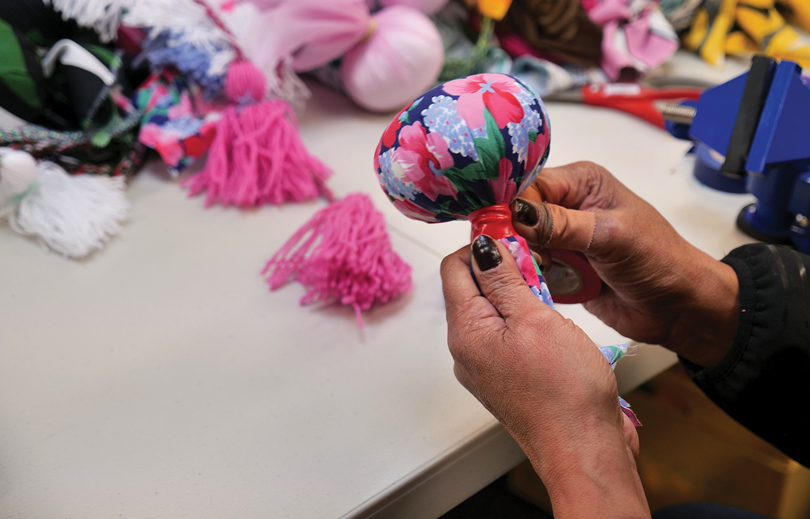
Above: Putting the finishing touches on poi made with biodegradable materials and up-cycled fabrics.
Initially the idea to make poi surfaced as a way to raise funds for a wānanga Georgia wanted to attend. “Georgia was introduced to poi at kōhanga and she taught me how to make them when she was really little,” says Anna. Georgia posted on Anna’s social media as she was too young to have her own page, and within three days they had enough orders to meet their fundraising goal, but it wasn’t until the whānau sat down to do the mahi that they realised the process wasn’t as simple as it seemed. “To start with we made really amateur poi. The braiding and the heads were awful and I remember being told we couldn’t sell them. I don’t know if it was so much about the poi being perfect, that people loved. It was about getting Georgia to her wānanga.”
Regardless of people’s opinions, Anna and Georgia brainstormed what a potential business could look like. They started by taking a photo of the first pair of poi Georgia made and turned it into a logo. “We began to think about a unique name for our mahi and what our core beliefs and values were.”
On maternity leave from her job as senior lecturer at Otago University’s pharmacy school for Hauora Māori, Anna had baby Api with her during the boot camp weekend. Having just become a big sister for the second time, Georgia considered future opportunities for her baby brother, born with Trisomy 21 (Down syndrome), when coming up with a business name. “Pōtiki is the last name of my ancestor Tahu Pōtiki who led my people to the South Island. Pōtiki also means, ‘youngest child’,” says Georgia. “I wanted to ensure my business could support him and others like him in our community.”
Having seen the interest in poi, the idea occurred to start a whānau business. Anna signed up for a 48-hour start-up boot camp in Kirikiriroa, which gave them access to experts and mentors in the business world. “At the boot camp we had to write a business plan, a financial plan and a pitch,” says Anna. “We had to have a strategy for our image, our branding and our market.”
The boot camp culminated in just three teams being chosen to pitch their idea for a chance to win $10,000 and ongoing mentorship. When Pōtiki Poi secured a coveted spot, it was up to 12-year-old Georgia to make the pitch. “They were asking us questions like how would you scale up, how many poi can you make in a minute, how many can you make in how many days?” says Anna. “And of course we had no idea. We just made poi in the living room at home.”
Although they did not win the grand prize, Pōtiki Poi was awarded People’s Choice and a connection to local organisation Petridish, a shared workspace in central Dunedin.
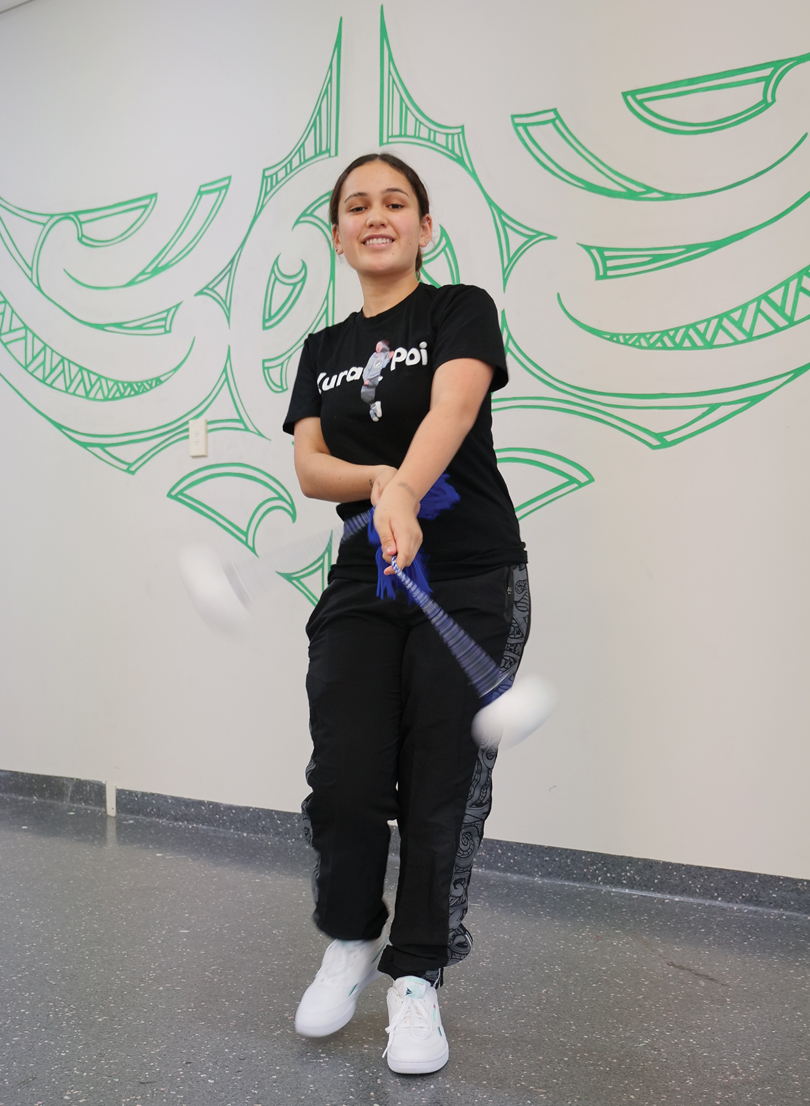
Above: Revitalising the art of poi. Georgia in front of the hand drawn mural she designed for the studio wall.
The whānau came home and dug into their research, heading to Otago Museum to see poi made by their ancestors. Anna’s voice cracks with emotion. “I think if I remember rightly we were close to tears if we didn’t cry. For us it was the first opportunity to see poi our ancestors made, not just see them but critique and look at how they were done. After we saw that, we said ‘That’s the poi we want to make’. Ours have a twist because that’s how our ancestors made them. We want to honour the past.”
As much as they wanted to make poi from the same natural materials their ancestors used, the pair understood they needed to be practical. “There’s a reason why our ancestors moved from raupō, to paper to stockings, to socks to everything else. The old poi are really hard, they hurt your wrists. If we made them that way they would hang on the wall and that’s all they would ever do. We have to honour what we know our ancestors did but also allow it to be contemporary.”
Armed with this mātauranga, the whānau put their heads together. “It was probably my brother, Georgia’s Uncle, and my husband who came up with the process of how to get it mass produced,” says Anna. “They looked at our processes and when the first prototypes fell apart the boys would get back to the drawing board.”
In the end they came up with something unique, what they could call a Pōtiki poi. “Eco-friendly materials, fabrics, upcycling, the twist – those things are our evolution of poi.”
Pōtiki Poi then entered another start-up business competition. “I was still breastfeeding at night so I would wake up to feed Api and I would think, how will we do this? I would write with a chalk pen on all the windows of the house. Every window was filled with my brainstorming and when Georgia got up in the morning I would pitch to her what I thought were answers to their questions.”
Georgia was tasked with pitching their business plan and this time Pōtiki Poi was awarded first-place and $12,000 to help start the business with a scholarship to a programme, six months’ rent free space, and a scholarship with a mentor. Within five months the business moved from the lounge to a studio at Cargill Enterprise, a company employing over 80 people with some level of diverse ability.
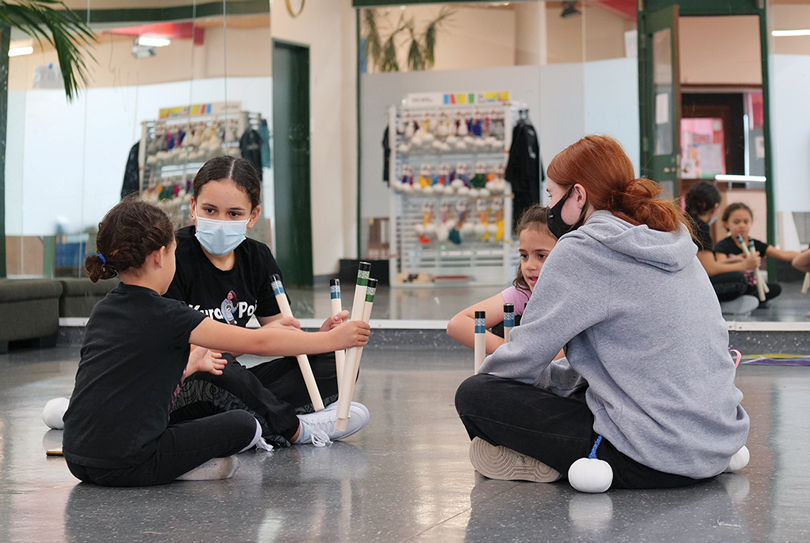
Above: Georgia teaches tī rākau to a teina class at the Kura Poi Dance Academy in Ōtepoti.
As word spread about Pōtiki Poi and its 12-year-old CEO, interviews came flooding in. With Anna’s maternity leave at an end, Georgia continued in her role as company spokesperson. One of the earliest interviews involved flying up to Tāmaki to appear on TV’s The Project. “She did a beautiful job,” says Anna. “The experience pitching the business definitely prepared her for being on camera.” Within hours of that interview, Pōtiki Poi was swamped with orders meaning the entire family had to chip in to help. “All of us would finish our day jobs and we would work until three in the morning to finish orders. We got some of the biggest buyers in New Zealand; Te Papa, Auckland Museum and they were buying up all the stock we had. We were just so shocked and saying ‘This is just ridiculous, how is this happening’?”
Interest in poi has not just been limited to Aotearoa. “It was an eye-opener that actually there are people from all across the world who want to know about us,” says Georgia. “I have literally sent poi all across the whole entire world, Europe, Japan and all across America.”
The biggest order landed recently, and at the worst possible time. “We had an order for 2000 poi going out in COVID packs for Te Pūtahitanga,” says Georgia. “I thought that was pretty cool, but it sucked that we were one of those households.”
The timing of their whānau bout with COVID also coincided with the opening of the Kura Poi Dance Academy, which had only been operating a week before having to close. “I think it was our first session and we had about 10 people. We were supposed to have our first proper classes on Thursday, but of course COVID decided to get in the way of that so we did online, live videos, instead.”
Poi may be the constant in [Georgia’s] life, but the future is tā moko. “People say, ‘If you move on, who will be the poi girl?’, but you don’t need a poi girl. Everybody has poi in them. It’s a part of your blood, it’s who you are as Māori, and even if you’re not Māori it’s a taonga to embrace.”
Georgia has just run her first wānanga, held during the school holidays. “We are teaching a lot of different things in the space but using it ultimately to share mātauranga and to have fun,” she says. She recently published a pukapuka, Ngā Mihi, which has come in handy as a teaching aide during class. “During the first lockdown we were doing some research about poi and found there was a lack of resources. Not many people know the whakapapa of poi and that’s what this book is about.”
For Anna, what made the wānanga extra special was that every registered child was Māori. “It wasn’t advertised or intended that way,” she says. “It was just a moment where I thought ‘Wow, we now get to work with our own people’. One of the biggest gaps in society for our young people is cultural identity. To heal that loss would give many people opportunities and that’s what we see here at Pōtiki Poi and Kura Poi.”
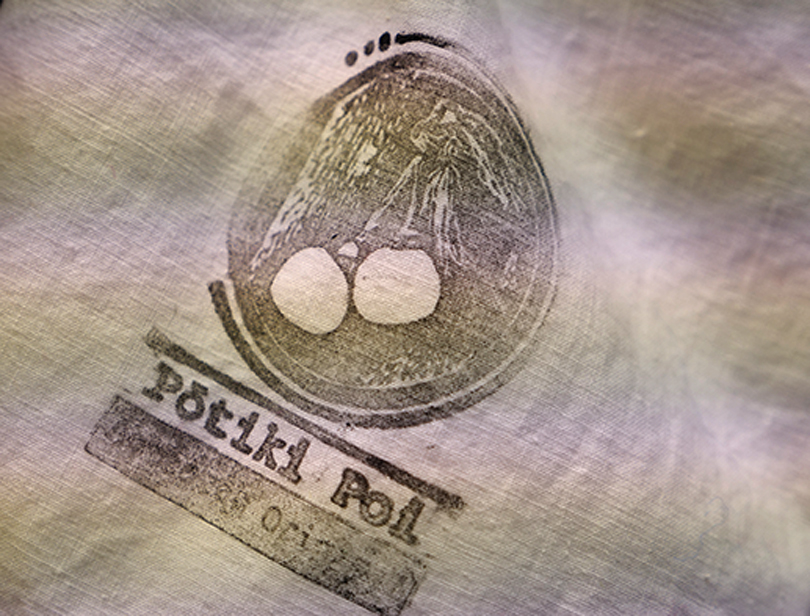
Above: Inspiration for the Pōtiki Poi logo came from a photo Anna took of the original poi made for Georgia’s fundraiser.
Having grown up feeling equally proud of her Māori and Pākehā whakapapa, Anna says they are not running an exclusive Māori organisation. “We have Abby who has no Māori whakapapa but an absolute love and passion for kapa haka and poi. People say ‘Oh that Treaty, what does it mean?’ It means lots of things, but ultimately it means two groups of people from two whakapapa celebrating that they live in this country together. That’s why it’s important Abby and Georgia are at the front of the class so that people can see an example of Treaty in action.”
There has been a lot to reflect on over the past three years, but Georgia says a highlight was being asked to speak at her kura. There were many questions including: How do I start a business? How do I write a book? Can we write a book? “I think that is one of the most fulfilling experiences I’ve gone through.”
Abby and Georgia are getting ready to wrap things up for the day. They practise the last of their moves in front of a large mural Georgia designed and drew on the studio walls. Poi may be the constant in her life, but the future is tā moko. “People say, ‘If you move on, who will be the poi girl?’, but you don’t need a poi girl. Everybody has poi in them. It’s a part of your blood, it’s who you are as Māori, and even if you’re not Māori it’s a taonga to embrace.”
For now the focus is on building the academy and creating a future where poi reaches beyond the boundaries of kapa haka. “When we think about poi we go straight to Regionals, Nationals and Te Matatini. There are all of those platforms but nothing just for poi,” says Georgia. “So how do we change the game? How do we make it enticing for rangatahi, for kaumātua, for mātua? And actually, being contemporary and acknowledging our changing ways would be the way.”
“We have been asked for poi with lights inside them. Is that wrong? I don’t think there is anything wrong with changing poi to adapt and evolve,” says Anna. “That’s what we have always done. Once upon a time they carried kai inside them – Kaiapoi – but now we have tikanga where you keep your poi off the food table. Poi have evolved and stayed, they are a taonga that we haven’t lost. The girls playing with the idea to make them into hip-hop moves just shows. As Georgia says, “Poi is kind of who we are. We live and breathe it every day – we are the future of poi.”